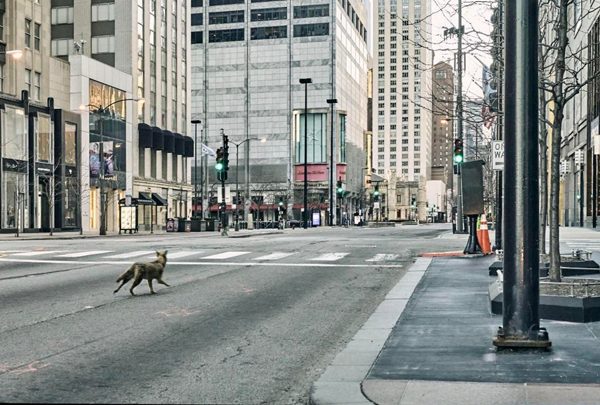By Timarie Diehl
April 14, 2020

The world economy has come to a grinding halt in response to the uncertainty surrounding COVID-19, giving the global community a unique opportunity to take a step back, reflect, and truly reshape our economic and environmental future. There is significant room for progressive legislation and structural overhaul of the economy and how it functions in relation to environmental protection. Having been through the 2008 economic crisis, we ought to take the time to look back on what was done well in the response to that crisis and what improvements can be made to ensure we do not repeat mistakes. Congress recently passed the largest economic relief bill in American history, and though short-term stimulus is essential on the individual level at present, it is important the next round of legislation puts in place parameters and stipulations at this pivotal moment which ensure both the nation’s economic future and its environmental goals. In a recent New York Times op-ed, Paul Krugman posited,
“There’s a very good case for putting a sustained, productive program of stimulus in place as soon as possible, instead of scrambling to come up with short-term measures every time bad things happen.”
By looking at the global climate crisis through the lens of the current pandemic, taking into account governmental and individual responses, we can use this opportunity to form a plan of action for the future.
In recent years, investments in fossil fuel companies have been trending downward globally as market investors anticipate the coming transition to a low-carbon economy. After the economic crash last month, these fossil fuel companies were first in line asking for government support. When global market equilibrium resets and investors consider their next moves, they will surely have noted the proportionately more severe downturn many fossil fuel companies have experienced (e.g. Exxon and Peabody coal are down a stunning 70%) when compared to the rest of the market, which is down 30% as of this writing. As Justin Guay of ClimateWorks Foundation noted recently, even if we bail them out, these fossil fuel companies will eventually “become zombies stripped of financial liability that screw over workers and lose future shareholders money”. The longstanding infrastructure of fossil fuel companies (e.g. power plants, oil wells, coal mines, pipelines) remains even after a company goes under, leaving opportunity for ambitious buyers to restart the cycle all over again. This has happened repeatedly to Peabody, for instance. So even if multiple fossil fuel companies do go bankrupt due to the current economic downturn, that does not mean they are completely removed from the fossil fuel landscape. Therefore, for the next round of government stimulus, it is worth encouraging our legislators to take a public stake in certain key players of the fossil fuel industry with the intent of enforcing Paris Agreement-compliant business plans or even the eventual management of an active reduction in fossil fuel production. Doing so would help ensure that the positive trends we observed before the current market crash will be permanent, continuing to propel us towards a low-carbon economy.
On an encouraging note, the new Green Stimulus Proposal has been gaining popular support in recent months. This rigorous plan outlines permanent, long-term environmental initiatives for the near future. It calls for rounding out environmental justice programs and transitioning to green energy while also focusing on a solution to jump-start the economy. Specifically, it proposes starting with an allocation of $2 trillion and stipulates this sum should be renewed automatically each year until (a) the economy is fully decarbonized and (b) the unemployment rate is below 3.5%. The proposal emphasizes the importance of new legislation addressing the economy as a whole as well as job creation specifically. The current spike in unemployment is of significant concern to many, up to 4.4% from 3.5% in February, as reported recently by Fortune. This 4.4% number is likely much lower than the actual percentage since it does not account for the final two weeks of March, which saw the greatest wave of layoffs in recent history. In 1933, during the Great Depression when the unemployment rate was as high as 20%, President Roosevelt implemented the Civilian Conservation Corps (CCC) as part of the New Deal. The CCC was clearly one example of capitalizing on a moment of economic restructuring as an opportunity of environmental conservation. FDR was committed to prioritizing environmentalism, and as such, CCC employees took part in all sorts of environmental projects: fighting forest fires, planting trees, reseeding grazing lands, building wildlife refuges and fish-rearing facilities, creating water storage basins, and establishing animal shelters. FDR saw the unique opportunity to help create jobs for environmentally beneficial projects. We are similarly positioned in this moment to promote the creation of green jobs and re-double our commitment to environmental protections. The Green Stimulus Proposal is a solid step in the right direction.
Another issue that has come to light during this pandemic is the disproportionate effect felt by our most vulnerable communities during times of crisis. Just as Hurricane Katrina spelled disaster in 2005 for low-income citizens in New Orleans, increasingly dangerous climate-related disasters continue to be of extra concern for underrepresented communities throughout the United States and across the globe. In Chicago, for instance, it was recently reported by the Department of Public Health that, of the city’s approximately 5,000 confirmed Coronavirus cases, African Americans make up 52% of those cases and 68% of the 118 deaths, despite making up just 30% of the city’s total population. Other cities around the country are noticing similar trends, which can be traced back to years of social inequality, the disenfranchisement of minority communities, and the disparity of resource allocation from local, state, and federal government agencies. We must consider these broader issues when crafting future legislation to avoid disparate responses to future natural disasters. While there is no quick or easy remedy to centuries of systemic inequality, grass-roots community engagement bolstered by governmental support is where we need to start. It is imperative we bear this in mind as we make plans for our Green Future.
Despite our reliance on the federal government to make lasting legislative decisions, there is also a heartening response on the grassroots level to this pandemic that is worth reflecting on. We have seen communities band together and take collective action to make radical lifestyle changes in an effort to stop this crisis — together. As a global community, life has halted while we listen to the scientists and the experts who are sharing their knowledge about how to handle the pandemic. The power of the individual and our desire to sacrifice certain liberties in the pursuit of a greater good is on full display during this time as people give up their daily routines in order to “flatten the curve.” This willingness of individual citizens to take on the burdens of broader society is precisely the type of mindset needed to address issues of climate change as well. Unfortunately, many still lack the motivation to prioritize environmental preservation in daily life, even as we witness the increasingly negative effects of climate change. The issue of climate change has been in the global zeitgeist for decades, yet it is often viewed as an approaching risk, something just over the horizon. There is ample evidence that it is truly a crisis now with the recent devastating Australian bushfires as just one example. Catastrophes like this call for drastic changes to our habits and our technologies. Yet many in the global community still consider climate change a long-term problem that does not require immediate action. For us to move forward in our fight to protect the environment and the global community, that perception needs to change. Hopefully, the urgency with which the global community has responded to the current COVID-19 pandemic serves as evidence that when we unite under a common goal, rapid positive change is possible.
According to a November 2019 joint report by Yale and George Mason Universities, half of all Americans believe that climate change is harmful for U.S. residents. If in the coming years, through grass-roots outreach and sweeping environmental legislation, we can convince a large majority of Americans that climate change poses an immediate existential risk, it stands to reason that large structural changes to our environmental response can be achieved.
 About the Author: My name is Timarie Diehl. I’m 27 years old and originally from New Jersey but have been living in Chicago for 4 years. I currently work at a translations company. However, I received a degree in Botany and Environmental Studies, and the majority of my work background is in organic farming, gardening, and food education. I found the 350 Chicago community only about a month ago, although I have been involved in environmental activism since high school. I am very excited to be part of 350 and have found a community of like-minded people!
About the Author: My name is Timarie Diehl. I’m 27 years old and originally from New Jersey but have been living in Chicago for 4 years. I currently work at a translations company. However, I received a degree in Botany and Environmental Studies, and the majority of my work background is in organic farming, gardening, and food education. I found the 350 Chicago community only about a month ago, although I have been involved in environmental activism since high school. I am very excited to be part of 350 and have found a community of like-minded people!



